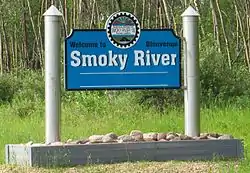Municipal District of Smoky River No. 130
The Municipal District of Smoky River No. 130 is a municipal district (MD) in northwestern Alberta, Canada. Located in Census Division No. 19, its municipal office is located in the Town of Falher.
Municipal District of Smoky River No. 130 | |
|---|---|
 Welcome sign | |
 Location within Alberta | |
| Country | Canada |
| Province | Alberta |
| Region | Northern Alberta |
| Census division | 19 |
| Established | 1952 |
| Incorporated | 1952 |
| Government | |
| • Reeve | Robert Brochu |
| • Governing body | MD of Smoky River Council |
| • Administrative office | Falher |
| Area (2021)[2] | |
| • Land | 2,834.18 km2 (1,094.28 sq mi) |
| Population (2021)[2] | |
| • Total | 1,684 |
| • Density | 0.6/km2 (2/sq mi) |
| Time zone | UTC−7 (MST) |
| • Summer (DST) | UTC−6 (MDT) |
| Website | mdsmokyriver.com |
History
On January 1, 1952, its name was changed from MD of Fillion No. 130 to its current name, which was taken from Smoky River, a tributary of Peace River.
Geography
Communities and localities
|
The following urban municipalities are surrounded by the MD of Smoky River No. 130.[3]
The following hamlets are located within the MD of Smoky River No. 130.[3] |
The following localities are located within the MD of Smoky River No. 130.[4]
|
Demographics
In the 2021 Census of Population conducted by Statistics Canada, the MD of Smoky River No. 130 had a population of 1,684 living in 637 of its 753 total private dwellings, a change of -16.1% from its 2016 population of 2,006. With a land area of 2,834.18 km2 (1,094.28 sq mi), it had a population density of 0.6/km2 (1.5/sq mi) in 2021.[2]
In the 2016 Census of Population conducted by Statistics Canada, the MD of Smoky River No. 130 had a population of 2,023 living in 720 of its 891 total private dwellings, a -4.8% change from its 2011 population of 2,126. With a land area of 2,840.14 km2 (1,096.58 sq mi), it had a population density of 0.7/km2 (1.8/sq mi) in 2016.[12]
References
- Alberta Municipal Affairs: Municipal Officials Search
- "Population and dwelling counts: Canada, provinces and territories, and census subdivisions (municipalities)". Statistics Canada. February 9, 2022. Retrieved February 9, 2022.
- "Specialized and Rural Municipalities and Their Communities" (PDF). Alberta Municipal Affairs. January 12, 2022. Retrieved January 21, 2022.
- "Standard Geographical Classification (SGC) 2006, Economic Regions: 4819041 - Smoky River No. 130, geographical codes and localities, 2006". Statistics Canada. March 5, 2010. Retrieved August 12, 2012.
- "Table 6: Population by sex, for census subdivisions, 1956 and 1951". Census of Canada, 1956. Vol. I: Population. Ottawa: Dominion Bureau of Statistics. 1958.
- "Table 9: Population by census subdivisions, 1966 by sex, and 1961". 1966 Census of Canada. Western Provinces. Vol. Population: Divisions and Subdivisions. Ottawa: Dominion Bureau of Statistics. 1967.
- "Table 3: Population for census divisions and subdivisions, 1971 and 1976". 1976 Census of Canada. Census Divisions and Subdivisions, Western Provinces and the Territories. Vol. Population: Geographic Distributions. Ottawa: Statistics Canada. 1977.
- "Table 2: Census Subdivisions in Alphabetical Order, Showing Population Rank, Canada, 1981". 1981 Census of Canada. Vol. Census subdivisions in decreasing population order. Ottawa: Statistics Canada. 1982. ISBN 0-660-51563-6.
- "Table 2: Population and Dwelling Counts, for Census Divisions and Census Subdivisions, 1986 and 1991 – 100% Data". 91 Census. Vol. Population and Dwelling Counts – Census Divisions and Census Subdivisions. Ottawa: Statistics Canada. 1992. pp. 100–108. ISBN 0-660-57115-3.
- "Population and Dwelling Counts, for Canada, Provinces and Territories, and Census Divisions, 2001 and 1996 Censuses – 100% Data (Alberta)". Statistics Canada. Retrieved May 25, 2019.
- "Population and dwelling counts, for Canada, provinces and territories, and census subdivisions (municipalities), 2006 and 2001 censuses – 100% data (Alberta)". Statistics Canada. January 6, 2010. Retrieved May 25, 2019.
- "Population and dwelling counts, for Canada, provinces and territories, and census subdivisions (municipalities), 2016 and 2011 censuses – 100% data (Alberta)". Statistics Canada. February 8, 2017. Retrieved February 8, 2017.
